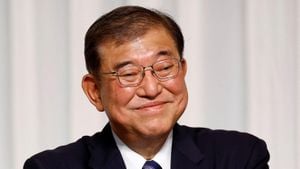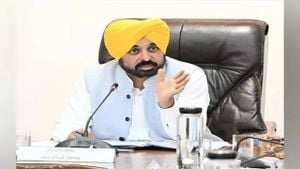Pressure is mounting on Germany's Chancellor Olaf Scholz as he faces increasing calls to step aside as the top candidate for his party, the Social Democrats (SPD), amid deterioring popularity and the impending snap elections. Scheduled for February, this election follows the collapse of Scholz's coalition government and places the future of his leadership on shaky ground.
Reports indicate Scholz's voter approval has plummeted, compelling senior SPD members to advocate for others to take center stage, most prominently Defense Minister Boris Pistorius. This shift reflects the urgency for the party to reconsider its leadership just seven months prior to the elections, significantly earlier than initially planned. The coalition, which Scholz has led since 2021, fell apart last month after his decision to dismiss Finance Minister Christian Lindner led the Free Democrats to exit the partnership, leaving the SPD and their Green allies without majority control.
Scholz's comments at the recent G20 summit, where he emphasized his commitment to unity within the SPD, seem to mark a notable departure from his earlier determination to pursue re-election. He stated, "We want to be successful together, we want to win together, I and the SPD." This appeal for solidarity contrasts sharply with the criticisms levied against him within his own party.
Norbert Walter-Borjans, a former leader of the SPD, articulated the growing sentiment for change, asserting Pistorius could have greater appeal against the conservative candidate Friedrich Merz, who is currently leading opinion polls. Walter-Borjans praised Scholz for his efforts during challenging times but underscored the need for the SPD to promote leadership capable of providing palpable differences to the electorate. Pistorius's recent rise to popularity, where he surpassed Scholz and took the first position among Germany's politicians, reflects this sentiment.
While Scholz still retains the backing of the SPD leadership, the pressure mounts with influential party members voicing their support for Pistorius. Politicians like Wiebke Esdar and Dirk Wiese from North Rhine-Westphalia noted their constituents expressed overwhelming support for Pistorius, linking Scholz's dwindling reputation to the coalition's failure.
Compounding Scholz's troubles is the backlash he faced for his recent communication with Russian President Vladimir Putin; this call has not sat well with many within Germany who remain wary of Russia's motives. Although Scholz appears to have the backing of key figures including former Chancellor Gerhard Schroeder, who defended him stating, "The party cannot destroy its own chancellor", his leadership is under intense scrutiny.
Reports also indicate growing uneasiness about whether switching leadership to Pistorius would reverse the SPD's fortunes. Critics have pointed out Pistorius's lack of economic experience as potentially detrimental, especially as Germany grapples with economic challenges and changing voter expectations. Recent polling data places the SPD at 15 percent—down from 25.7 percent—while the conservative CDU/CSU leads at 33 percent and the far-right Alternative for Germany (AfD) follows at 18 percent.
Scholz is facing what appears to be his last opportunity to stabilize his government before the confidence vote scheduled for December 16, which he is expected to lose. Following this, the road would be set for elections on February 23, and the question lingers: can the SPD recover, or will they succumb to external pressure and internal divides?
With tensions rising and time running short, the political atmosphere surrounding Scholz is fraught with uncertainty. His party, the SPD, finds itself grappling with external pressures, the potential of unexpected leadership changes, and the overriding question of whether they can reclaim public trust before the ballot boxes open. While Scholz fights to maintain his role, many within the party believe the tides may be turning—ushering in not just new leadership, but perhaps new directions within the SPD.



